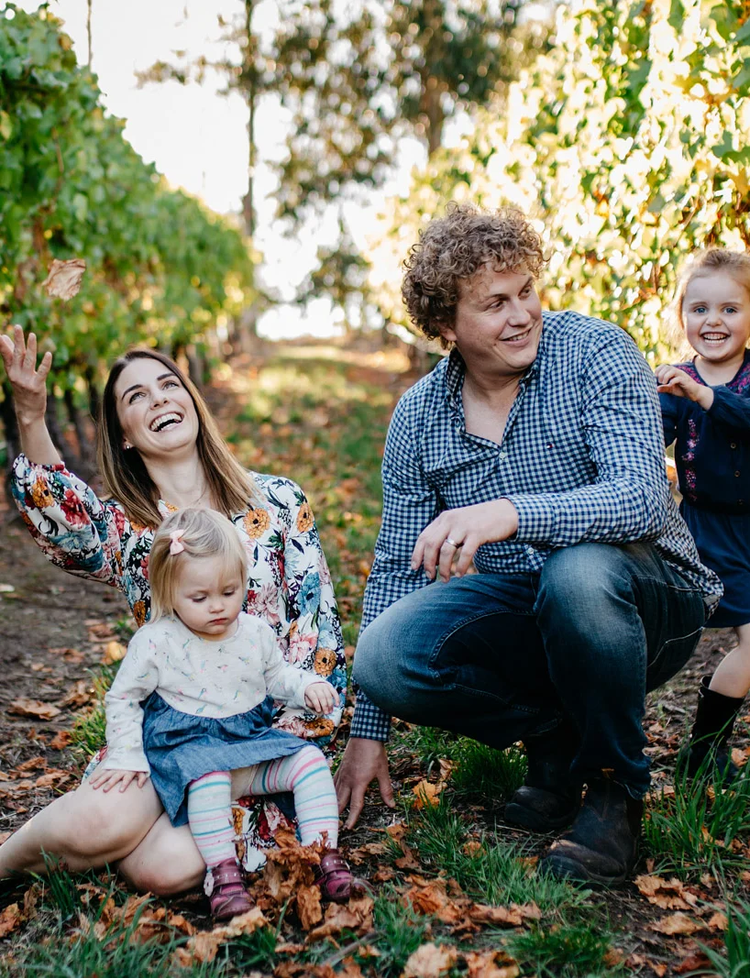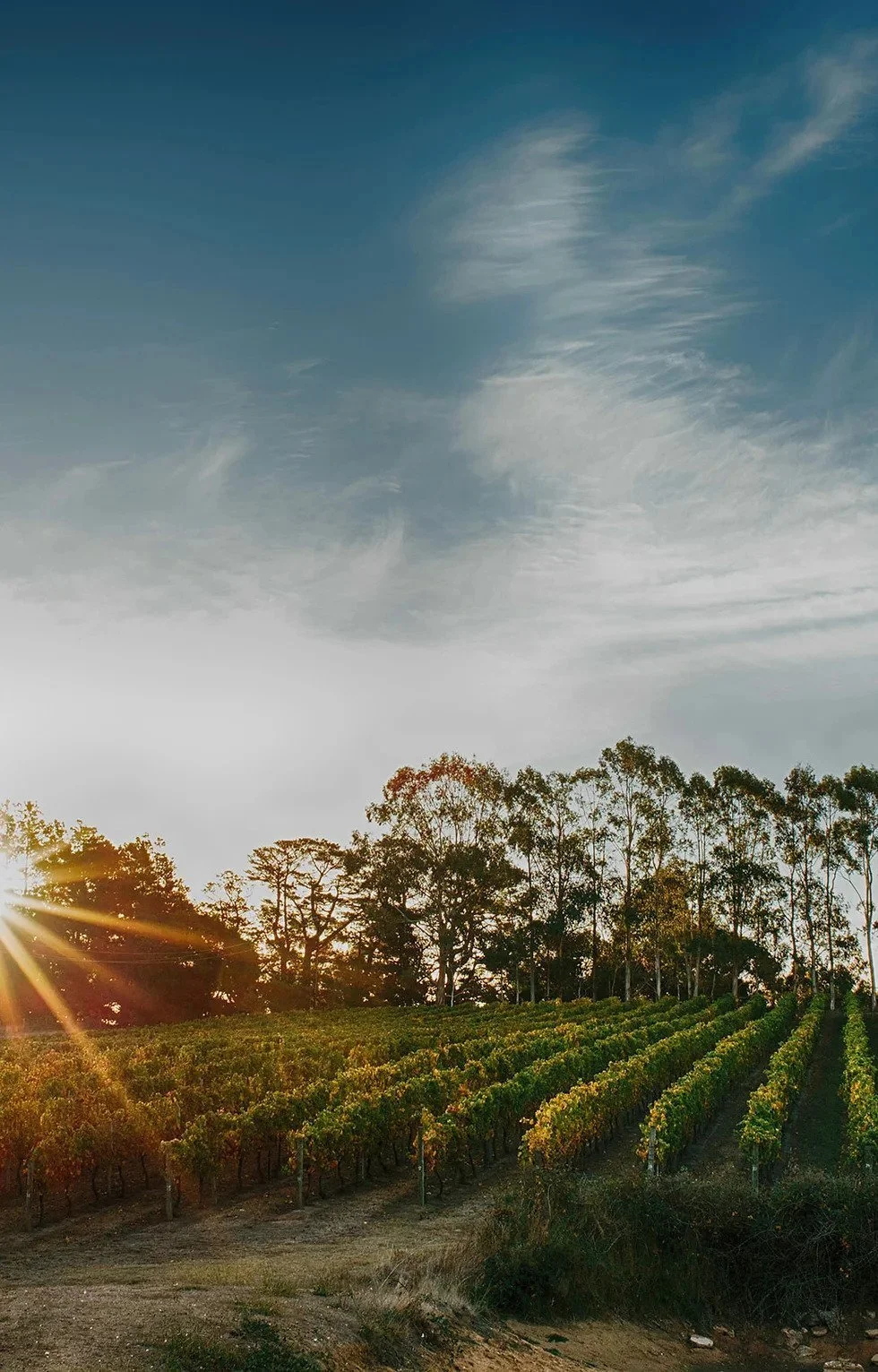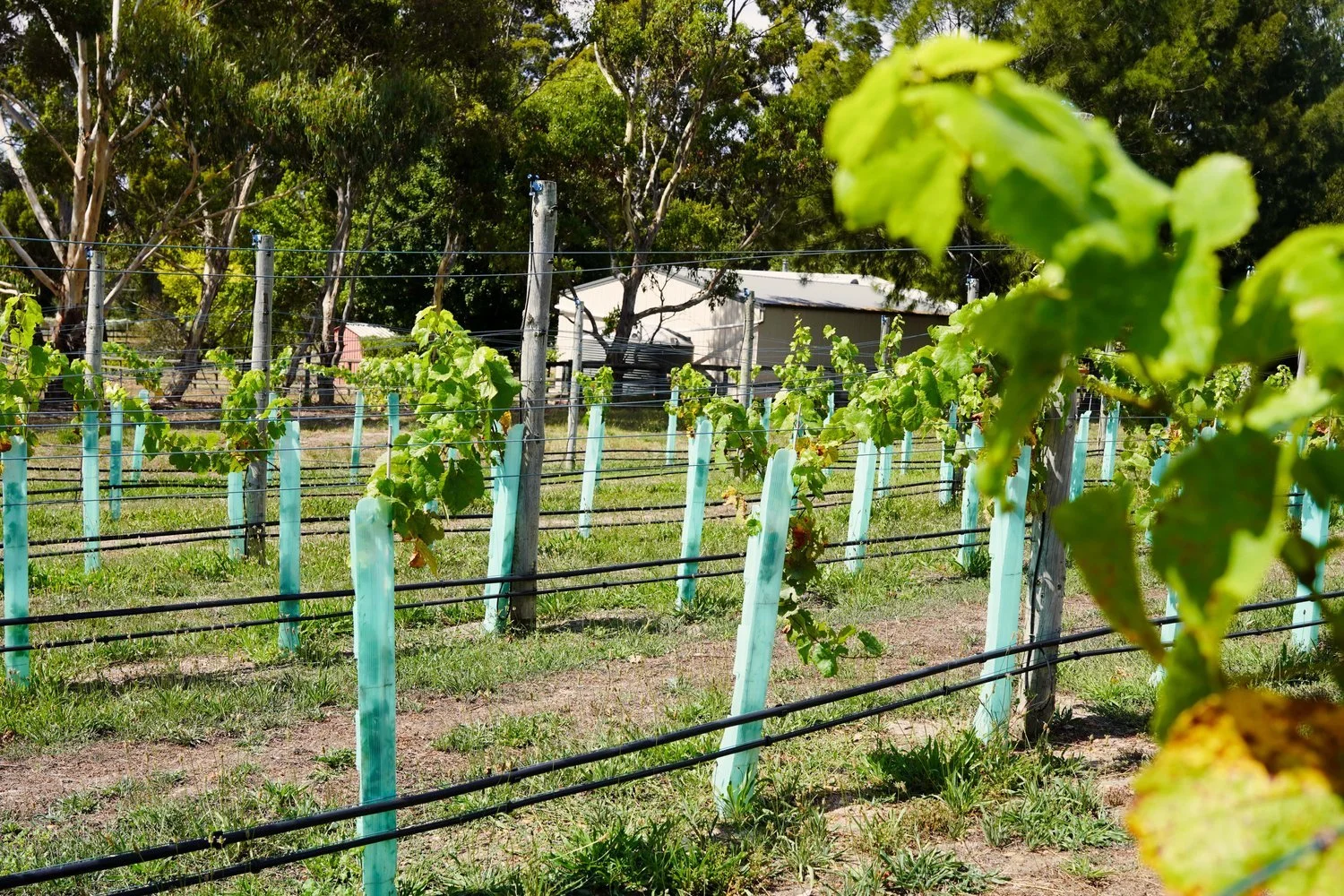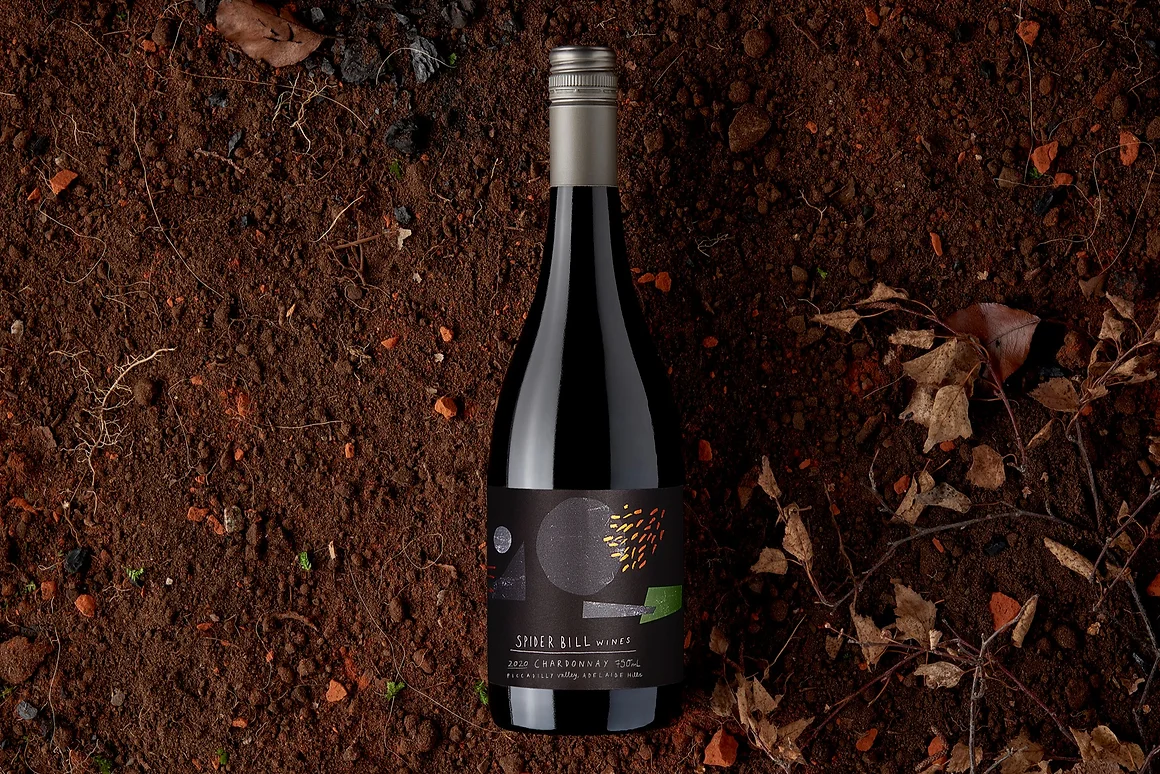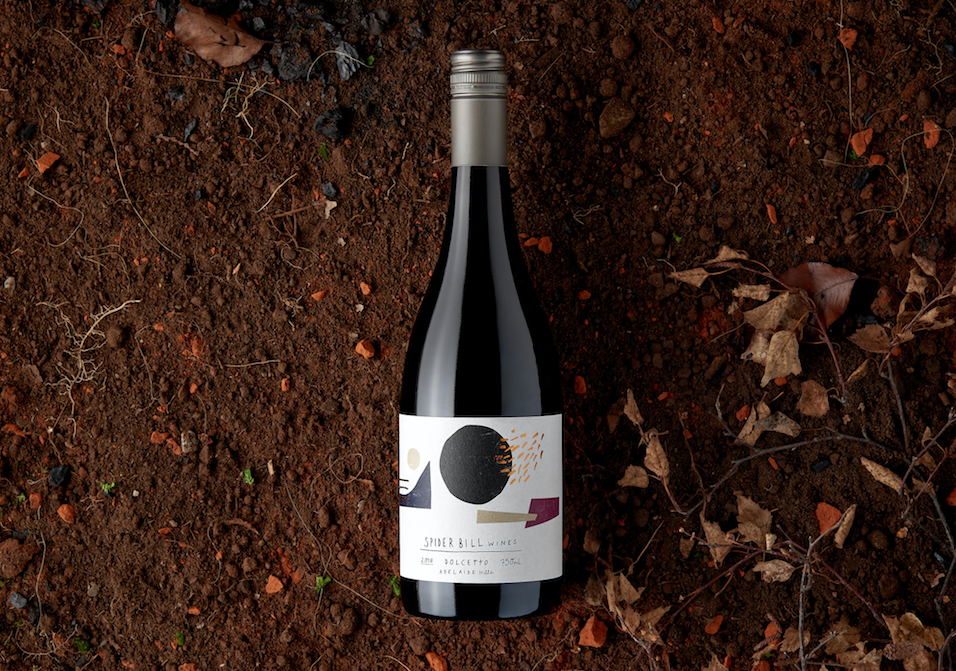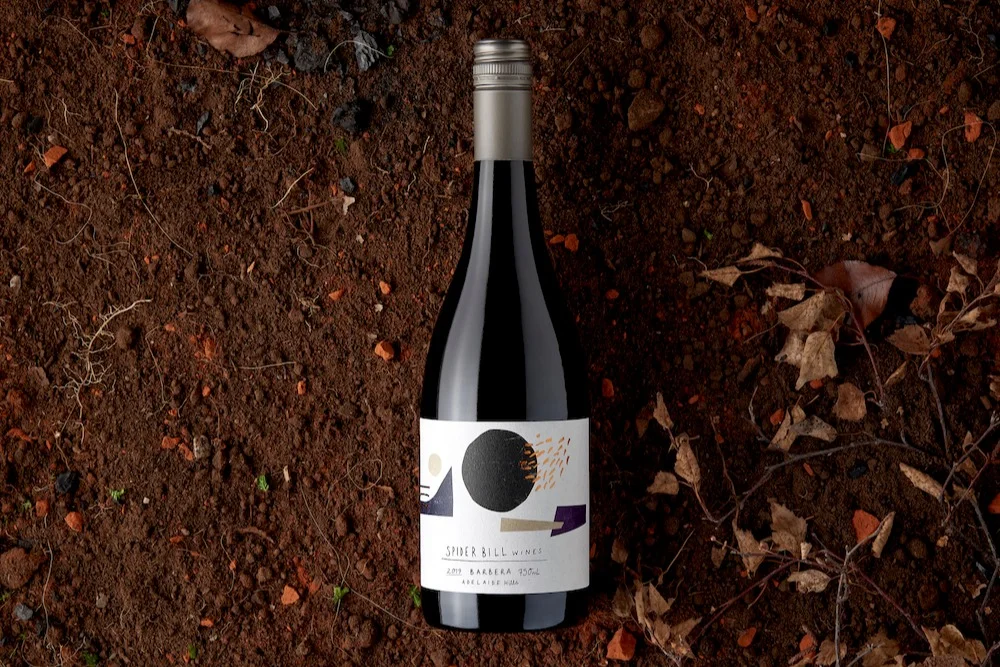Spider Bill
Adelaide Hills, South Australia
Just when we thought we’d seen it all from Adelaide Hills winemaker prodigy Tarrant Hansen, he unveils his plans of expansion for Spider Bill, including a winery, more Chardonnay and Pinot Noir plantings, and even a cellar door, all of which he plans to add to his Verdun home property over the coming years. What about the wines? Well, they’re as fresh and stunning as ever, a picture of crystalline purity and flavour generosity.
As we taste through the new releases, Tarrant’s perfectionist disposition comes as no surprise. These are to the point and take no prisoners in uncovering the truth about what it is that makes the Adelaide Hills a distinguished wine region that offers winemakers like Tarrant boundless creative possibilities. We are fortunate bystanders.
NV Sparkling Blanc de Blanc
For his inaugural Spider Bill NV Blanc de Blanc, Tarrant opted for a blend of 2020 and 2021 vintage base wines. All the Chardonnay comes from the Uva vineyard in Piccadilly. The juice was barrel fermented on full solids and kept on lees for six months. The wine was tiraged in mid July 2021 and disgorged the end of 2023/start of this year. This pristine sparkling wine has a linear style, much like the Spider Bill Chardonnay, with added complexity from 34 months on lees in bottle before disgorging in May 2024. Dosage 6g/L.
2021 Verdicchio
The Adelaide Hills’ undulating topography promotes a wide range of microclimates that nuance the cool, wet climate that prevails. In addition, each site’s unique combination of soils, altitude, and aspect, shapes the quality of fruit and the destiny of grape varieties. This was also true for Tarrant’ fate, when he googled “where is good to live near Adelaide?” and landed in the Adelaide Hills ten years ago. Tarrant was fortunate to complete a vintage in Italy’s Langhe, where his love for Italian varieties was solidified. Over time, Tarrant accumulated the knowledge and winemaking skills to produce wines from exciting varieties like Verdicchio, which have helped him put down roots in the Adelaide Hills. This Verdicchio is perfect with grilled octopus and preserved lemon chermoula.
Winemaking:
The fruit comes from the Parish Hill Vineyard in Uraidla. It was whole bunch pressed and barrel fermented on full solids. The wine was left on lees without stirring for 3 months in old French barriques, where it underwent partial malolactic fermentation.
Tasting Notes:
Pale yellow with bright green reflections, Verdicchio’s sapid profile is on full display here – bright citrus fruit characters, some gritty pear and juicy apple notes, and a mouth-watering acidity complemented by that typical bitter twist on the finish.
2022 Chardonnay
As the largest vintage to date for Spider Bill, the 2021 harvest produced quite the crowd-pleasers, such as the Adelaide Hills Chardonnay. It is well and truly a continuation of Tarrant’s small batch, approachable wines made with modern Australian every day drinking and eating culture in mind. It is a fuss-free expression of premium Adelaide Hills fruit. Enjoy it with butterflied lemon and thyme roast chicken.
Winemaking:
The fruit comes from select parcels in Piccadilly Valley and Lobethal. It was whole bunch pressed and barrel fermented on full solids. The wine then spent 9 months in old and new (15%) French oak barrels. It did not go through malolactic fermentation.
Tasting Notes:
This Chardonnay has a lovely pale lemon hue and a hint of greenness in its rim. The nose leads you on with seductive aromas of tart nectarine, Meyer lemon and green melon. The palate is linear, with more pronounced citrus and stone fruit flavours that meld with toasted almond oak characters adding intensity to the fine, focused acid line.
2021 Chardonnay ‘Uva’
Winemaking:
Harvested from 1991 Chardonnay plantings in the estate Uva vineyard in the Piccadilly Valley. The bunches were hand harvested and kept whole, then pressed directly to barrel for fermentation. The wine did not go through malolactic fermentation. It had 50% new oak.
Tasting Notes:
Citrus fruits and aromas of white flowers. Really focused palate with good length.
2021 Chardonnay ‘Shoenthal’
Winemaking:
The fruit comes from a vineyard which is located just outside of Lobethal. It was pressed whole, directly to barrel. The wine did not go through malolactic fermentation and 100% of it was put in new oak barrels to build body and texture as well as complexing flavour characteristics.
Tasting Notes:
Much rounded riper fruit profile, citrus fruits of lemon and lime on the front and mid palette. With a hint of peach character on the finish.
2023 Pinot Noir
Since it was first released in 2015, the Spider Bill Pinot Noir stood out for its lithe structure. Clonal selection has also played a major role in the production of this lightly framed yet complex Pinot Noir. As a result, the Spider Bill Pinot Noir has a Burgundian feel to it; the lean, sinewy kind that puts the drink in drinkability. A match made in heaven with crispy skin duck and shallot tarte tatin.
Winemaking:
A mix of clones (114, 115, D5V12, MV6 and 777) was picked form Chapel Valley in Piccadilly and the Balhampton Vineyard in Balhannah. Each clone and parcel were fermented separately in small open top ferments (7 different ferments), including varying degrees of whole bunch (from 1 to 100%). Caps were gently plunged by hand twice daily to manage the warm ferment temperatures.
Tasting Notes:
It is light on its feet, yet it packs a punch. The nose echoes the clear pale ruby colour with beautiful red fruit characters, quintessentially Adelaide Hills. Tart raspberry and sour cherry characters dominate the palate. Hints of sweet spice characters mix with remarkably defined, soft tannins, and a striking acid line leading on a bright, juicy finish.
2020 Pinot Noir ‘Arranmore’
In a crowded wine scene, this wine stands out by the fact that the fruit is sourced from one of the best and oldest sites in the Adelaide Hills. Candice Helbig and Frewin Ries tend the Arranmore vineyard on their Carey Gully property. The Arran homestead and property date back to 1859, making it the oldest in Carey Gully. The previous owner researched and documented the rich history of the place, dating back to the times it had market gardens and fruit trees, pointing to the fertile grounds. The vineyard was planted in 1996. Since acquiring it in 2016, Candice and Frewin have capitalised on the right variety in the right place, utilising the altitude (550 meters above sea level), aspect, soil, and air currents to their advantage. This is a very intricate Pinot Noir that shows its origins in a broodier nature that will reward patient cellaring. For now, enjoy it with salt and pepper quail.
Winemaking:
A mix of clones was picked. Each clone was fermented separately in small open top ferments, including some whole bunches (20%). Caps were gently plunged by hand twice daily to manage the warm ferment temperatures. The wine spent up to 9 months in a generous amount of new oak.
Tasting Notes:
The intense aromas of violet and rose are in perfect harmony with red berry fruit and sweet spice characters. The polished blackberry, cherry kirsch, red plum and fine, drying tannins spread amply across the palate. The finish is superb with lingering nutmeg spice and blackberry jam sweetness.
Aromas of violets, blueberries and red cherries, as well as herb and spice notes, some pink grapefruit and white pepper. The palate has a very intense core of fine sturdy tannin. Quite savory and crisp with tangy red-fruit flavours to close. Drink over the next three years. 91 pts. Nick Stock.
2022 Pinot Noir ‘Chapel Valley’
It’s the first time releasing a single vineyard wine from this vineyard.
Winemaking:
The fruit was hand harvested and whole bunch fermented (30%). 30% new oak gives it a little more char and phenolic structure.
Tasting Notes:
Red fruits and spice fill the palate, and a more earthy, savoury undertone lingers on the finish.
2022 Grenache ‘McLaren Vale Fi’s Block’
A new addition to the range. After seeing these vines Tarrant couldn't resist making a wine from them. Rarely do you get vine age over 30-40 years in the Adelaide Hills. Seeing gnarly old vines (70+ years) growing on what resembles a beach (the whole vineyard is covered in a deep layer of Maslin sand), the fruit was irresistible.
Winemaking:
Whole berries were fermented in open top fermenters and hand plunged twice daily. The wine was left on skins for 7-8 days and pressed directly to one old puncheon, where it remained for 9 months prior to bottling.
Tasting Notes:
The palate is generous with red fruits, amaro spice and a hint of orange peel. Only old oak was used to let the fruit shine. This is an exciting wine.
2021 Dolcetto
Tarrant’s fascination for all things Italian has earned him a Young Gun of Wine nomination as one of the Adelaide Hills’ top winemakers in 2020. The core message in the bottle is an invitation to try different things, which deserves to be answered enthusiastically. In a crowded wine scene, this wine stands out by the fact that the fruit is grown in the Adelaide Hills, which are much cooler than Dolcetto’s Italian home. As its Italian counterpart, this Dolcetto is best enjoyed now with classic tomato-based dishes or favourite mouth-watering antipasto items, like anchovies, olives, and salami.
Winemaking:
The fruit was picked from the Yacca Paddock in Kuitpo, where the cool nights and warm days contribute to perfect ripening conditions. The whole berries were fermented in small open top fermenters, with gentle cap management. It was pressed off skins shortly after to manage the firm tannin profile.
Tasting Notes:
The Spider Bill Dolcetto is playful and plump, with ripe, luscious fruit that feels like silk on the palate – sweet cherry, black plum, raspberry jam, and cherry ripe chocolate mixed with fresh herb characters. The soft, moreish tannins are balanced by a lip-smacking acidity.
2022 Barbera
Longview Vineyards paved the way for Barbera in the Adelaide Hills, thus allowing producers like Spider Bill who followed their tracks on their pursuit of interesting styles of wines that push boundaries. In a project spanning ten years in the making, two Piemontese clones were chosen for their suitability to the cool climate of the Adelaide Hills. Located in the south-eastern ridge of the Mount Lofty Ranges at more than 400 meters above sea level, Macclesfield enjoys warm summer days contrasted by cool coastal winds, resulting in high diurnal ranges that make this site suitable for varieties like Barbera. Utilising his mastery of age-old winemaking techniques acquired during vintage in Piemonte, Tarrant produced this easy-drinking Barbera he affectionately calls Barbs. Thanks to its good natural acidity and soft tannins, it would be perfect with slow cooked osso buco and rigatoni.
Winemaking:
The fruit was sourced from the Longview Vineyard in Macclesfield. It was entirely whole bunch fermented in open top fermenters, to balance the natural acidity in the final wine. This is the third vintage of Spider Bill Barbera. It generally spends 4 months in neutral oak for an early Spring release, in a similar vein to Piemonte’s early release dates.
Tasting Notes:
It has a vibrant ruby colour. Classic lavender and star anise characters are mixed with the most exalting blackcurrant, raspberry, and sour plum aromas on the nose. It is supple and fleshy with a core of fruit so lively the fine tannins can hardly contain them as they take hold of the palate. The high acidity gives it a fresh, crunchy finish.
2020 Nebbiolo
Winemaking:
The fruit was sourced from the Longview Vineyard in Macclesfield. It was whole bunch pressed (20%) early to preserve red fruits and floral aromas. Destemmed, fermented and kept on skins for 4 months. This provides the density and backbone to the core of the wine.
Tasting Notes:
Red fruit spectrum, red cherry, raspberry with hints of earthy aromas. Good tension and tannin core. Suede-like rather than big and chunky.
2019 Riserva Nebbiolo
This is the bottling from the very last barrel from a vineyard in Woodside that was burnt down in the Cuddlee Creek bushfire (20/12/2019). In the months that followed, Tarrant held back a barrel from the 2019 Nebbiolo and left it in barrel for a further 2 years and bottle for 2 years, bringing the wine to a total of 3 years in barrel 2 years in bottle prior to release.
Winemaking:
The fruit was sourced from a vineyard in Woodside that was lost to the Cuddlee Creek fires (20/12/2019). The last barrel of wine. In commemoration, Tarrant held back a barrel from the 2019 Nebbiolo and left it in barrel for a further 2 years, and bottle for 2 years, bringing the wine to a total of 3 years in barrel 2 years in bottle prior to release.
Tasting Notes:
This wine still looks remarkably vibrant, still displaying the typical red fruits expected of the variety. Some tertiary characters are starting to show now, giving the wine the added layer of complexity you would expect. Only 20 cases remain.
2019 Syrah
Longview’s Maccelsfield site, with its high-altitude windswept slopes, produces cool climate Syrah with a semi-skeletal frame and unlikely deep flavours. The low-yielding vines have reached the perfect level of maturity (25 years) to produce fruit with complexity and breathtaking elegance known to the Spider Bill Syrah. Lamb cutlets are the way to go with it.
Winemaking:
The fruit was whole bunch pressed (50%) and wild fermented in stainless steel at controlled temperature. The wine went through malolactic fermentation in 100% old French oak barrels, where it finally spent 9 months.
Tasting Notes:
It has a cheerful purple colour. The bright red cherry, raspberry and sweet star anise, lavender and peppery characters jump out of the glass. The palate is supple with dark and red berry fruit flavours gently flowing across. This is an extremely quaffable Syrah with understated tannins that leave a satisfying feel on the finish.


